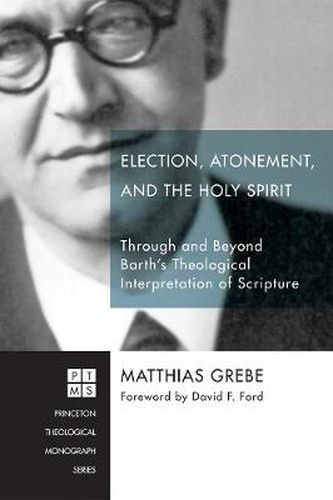Readings Newsletter
Become a Readings Member to make your shopping experience even easier.
Sign in or sign up for free!
You’re not far away from qualifying for FREE standard shipping within Australia
You’ve qualified for FREE standard shipping within Australia
The cart is loading…






This title is printed to order. This book may have been self-published. If so, we cannot guarantee the quality of the content. In the main most books will have gone through the editing process however some may not. We therefore suggest that you be aware of this before ordering this book. If in doubt check either the author or publisher’s details as we are unable to accept any returns unless they are faulty. Please contact us if you have any questions.
This book examines the doctrines of election and atonement in Karl Barth’s Church Dogmatics, taking up Barth’s own challenge to his reader to surpass his argument and offer a better typological interpretation of the cultic texts. Barth’s radical re-working of Calvin’s doctrine of election is one of the most important developments in twentieth-century theology. Christ synthesizes for Barth a particular dialectic: the binary structure of God’s Yes of election and God’s No of rejection. The book’s central question–how can Jesus simultaneously be both the elected and the rejected (CD II/2), acting as both the judge and the judged (CD IV/1)?–is followed by an exploration of the roles of the Holy Spirit and human freedom in God’s electing and saving action. Commentators both acknowledge Barth’s innovation in this area and identify problems with his approach, but few have offered what David Ford has called a correction from within Barth, using Barth’s own method. Using the concept of Existenzstellvertretung, this critique of Barth’s exegetical justification for the doctrines offers an alternative exegesis that not only provides this much-needed correction, but also immerses the reader in a fresh engagement with Scripture itself.
$9.00 standard shipping within Australia
FREE standard shipping within Australia for orders over $100.00
Express & International shipping calculated at checkout
Stock availability can be subject to change without notice. We recommend calling the shop or contacting our online team to check availability of low stock items. Please see our Shopping Online page for more details.
This title is printed to order. This book may have been self-published. If so, we cannot guarantee the quality of the content. In the main most books will have gone through the editing process however some may not. We therefore suggest that you be aware of this before ordering this book. If in doubt check either the author or publisher’s details as we are unable to accept any returns unless they are faulty. Please contact us if you have any questions.
This book examines the doctrines of election and atonement in Karl Barth’s Church Dogmatics, taking up Barth’s own challenge to his reader to surpass his argument and offer a better typological interpretation of the cultic texts. Barth’s radical re-working of Calvin’s doctrine of election is one of the most important developments in twentieth-century theology. Christ synthesizes for Barth a particular dialectic: the binary structure of God’s Yes of election and God’s No of rejection. The book’s central question–how can Jesus simultaneously be both the elected and the rejected (CD II/2), acting as both the judge and the judged (CD IV/1)?–is followed by an exploration of the roles of the Holy Spirit and human freedom in God’s electing and saving action. Commentators both acknowledge Barth’s innovation in this area and identify problems with his approach, but few have offered what David Ford has called a correction from within Barth, using Barth’s own method. Using the concept of Existenzstellvertretung, this critique of Barth’s exegetical justification for the doctrines offers an alternative exegesis that not only provides this much-needed correction, but also immerses the reader in a fresh engagement with Scripture itself.